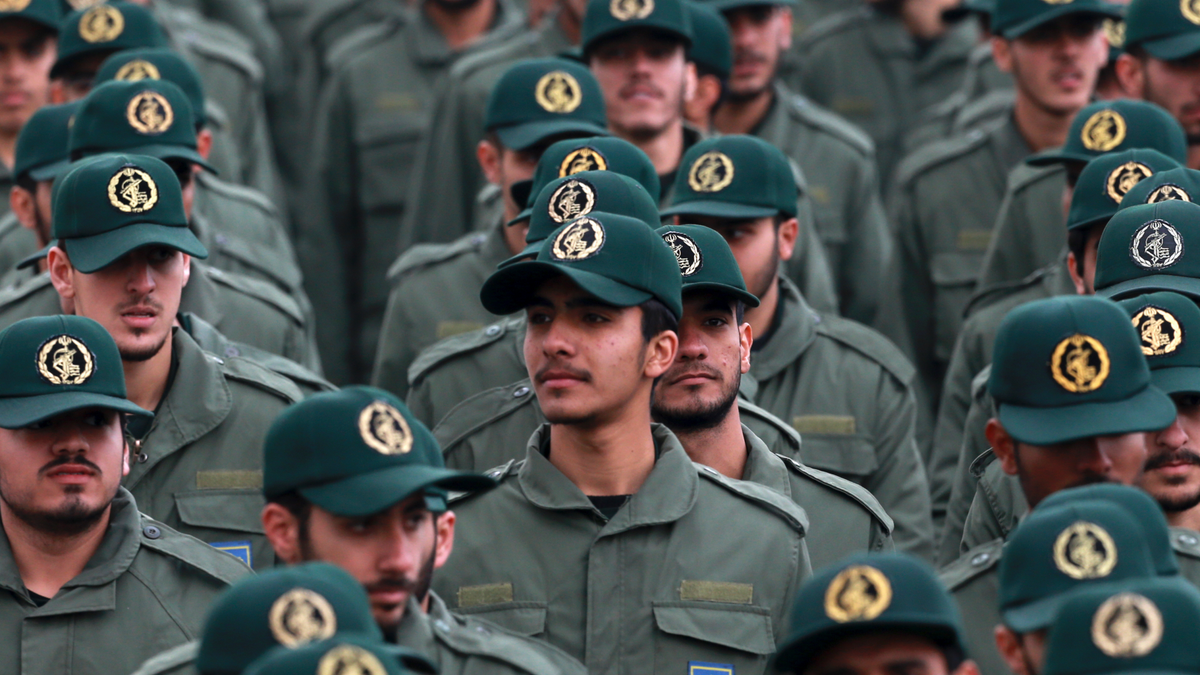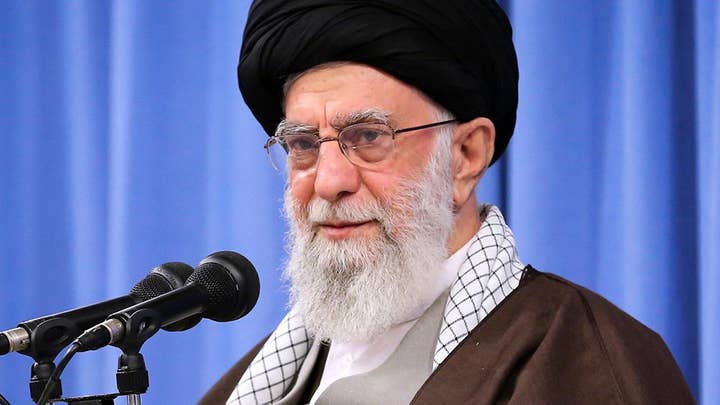Iran admits to killing protesters, calls them armed rioters
Amnesty International says evidence shows security forces shooting at unarmed protestors; State Department correspondent Rich Edson reports.
The United States government announced even more sanctions on Iran on Thursday, this time taking aim at two judges presiding over branches of the regime’s Revolutionary Court accused of “punishing Iranian citizens and dual-nationals for exercising their freedoms of expression or assembly” and in some cases “sentencing political prisoners to death.”
“The United States will not be a bystander to ongoing oppression and injustice in Iran,” Treasury Secretary Steven Mnuchin said in a statement. “This Administration is targeting those in the regime who seek to censor protestors, persecute religious minorities, and silence the Iranian people.”
The new sanctions have been placed on Judge Abdolghassem Salavati, who presides over the infamous Branch 15 of the Tehran Revolutionary Court “where he has prosecuted and delivered harsh sentences,” the Office of Foreign Asset Control (OFAC) stated. The sanctions also target Mohammad Moghisseh, who presides over Branch 28 “where he has overseen countless unfair trials, during which charges went unsubstantiated, and evidence was disregarded.”
“All property and interests in property of these persons’ subject to U.S. jurisdiction are blocked, and U.S. persons are generally prohibited from engaging in transactions with them,” OFAC warned. “Foreign financial institutions that knowingly facilitate significant transactions for, or persons that provide material or certain support to, risk exposure to sanctions that could sever their access to the U.S. financial system.”
INSIDE IRAN’S DEADLY ARMORY AND ITS CAPABILITIES TO FIGHT THE US
The sanctions are just one of many that have been slapped on the Islamic Republic over the past eighteen months.
It has been more than 40 years since the United States imposed its first round of economic sanctions on Iran in response to the hostage crisis and violent takeover of the U.S. embassy in Tehran. The ensuing years have been fraught with intense hostilities between the two nations, puncturing even deeper since the Trump administration pulled out of the controversial JCPOA, better known as Obama’s Iran Deal, in May 2018.

In this photo released by the official website of the office of the Iranian Presidency, President Hassan Rouhani speaks in the inauguration ceremony of a power plant in northwestern Iran, Thursday, Aug. 1, 2019. Rouhani said U.S. financial sanctions on Iran's foreign minister are "childish" and a barrier to diplomacy. (Iranian Presidency Office via AP)
Not only did the move re-instate the long-held sanctions on Iran, but the U.S. government has continued to inflict economic restrictions as part of a “maximum pressure” campaign intent on curbing the country’s nuclear ambitions and support for terrorism once and for all.
Earlier this month, the Trump administration sanctioned three Mahan sales representatives based in Hong Kong and the United Arab Emirates. Secretary of State Mike Pompeo additionally announced another round of Iranian sanctions – this time targeting a shipping network of Iranian companies for trafficking “lethal aid” to war-ravaged Yemen.
IRAN NUCLEAR EXPERTS TESTING NEW ADVANCED CENTRIFUGES FOR URANIUM ENRICHMENT, ROUHANI SAYS
The U.S. State Department also disseminated a sanctions advisory this week exhorting parties who transfer or export crucial steel-making inputs – needle coke and graphite electrodes – to Iran, are at risk of violating U.S. laws, alleging that the revenue Iran draws from steelmaking may contribute to “proliferation programs, campaigns of regional aggression, and support for terrorist groups.”
And late last month, the U.S. imposed sanctions on Iran’s information minister, Mohammad Javad Azari-Jahromi, for “wide-scale internet censorship” in retaliation for the five-day shuttering of the internet in a quest to scuttle the mass anti-government protests against the hike in fuel prices.

Anti-government protesters celebrate a soccer match win in Tahrir Square in Baghdad, Iraq, Thursday, Nov. 14, 2019. Iraqis are celebrating a 2-1 win over Iran in a much-anticipated World Cup qualifying match. (AP Photo/Hadi Mizban)
An advisory issued by the treasury department in July cautioned that anyone “considering continued aviation business with Iran” would be dealt a harsh blow, highlighting that even Iran’s commercial carriers were involved in smuggling weapons and fighters to proxy conflicts abroad. The U.S. has thus sanctioned numerous entities linked to Iran’s aviation industry, its first private airline Mahan Air, and overseas sales agents and front companies used by the industry to secure airline parts.
In September, the U.S. disclosed another bundle of sanctions zeroing in on Iran’s national bank and national development fund. In May, the Trump team sanctioned the country’s metals industry, which is considered its most abundant means on nonpetroleum earnings. In April, the administration – despite pushback from some Pentagon top-brass – designated the elite Revolutionary Guard Corps a terrorist organization, marking the first time the U.S. had labeled a wing of another country’s government with such a tag and subsequently triggering a storm of travel and economic sanctions.
That is just the tip of the iceberg. U.S. sanctions have been foisted on scores of individuals, organizations, and entities nationwide, targeting scores of sectors from military and politics to trade and natural resources, taking a dramatic toll on the Iranian economy. The International Monetary Fund (IMF) predicts “zero growth” in 2020.
But the continual array of sanctions begs the question: what is left to squeeze? How much further can the United States go with its fistful of soft power?
“The latest designations are about standing with the Iranian people and naming and shaming their oppressors,” Behnam Ben Taleblu, a senior fellow at the Foundation for Defense of Democracies, told Fox News. “The Trump administration appears dedicated to exposing all those who contribute to the full scale of Iran’s malign activities, be it foreign aggression or domestic suppression. Sanctions are a tool that can be used to counter both prongs of that threat.”
From Taleblu’s viewpoint, if the imposition of sanctions appears endless, it is because “there are so many threats that need countering.”
“There is still much left to sanction, such as on the financial side with Iran’s regional and local trade over electricity or cement, or targeting the trade of goods and parts used to power Iran’s non-oil sector, and then, of course, there’s the Supreme Leader’s assets and business empire,” he said. “Washington can also do much more on the human rights side. Every time there is a protest, Washington should designate the local unit, be it police, Basij, or IRGC, which suppresses them, as well as local officials and judges that support this crackdown. There is an entire universe of individuals and entities that still need to be sanctioned. The U.S. is not near maxing out its sanctions tools against Iran.”
THE MASTER BEHIND THE MASK: WHO IS IRAN’S MOST FEARED AND POWERFUL MILITARY COMMANDER?
A report released by the Congressional Research Service in November underscored that the reinstatement of U.S. sanctions “has driven Iran’s economy into recession as major companies have exited the Iranian economy and Iran’s oil exports have decreased dramatically.”

In this Feb. 11, 2019 file photo, Iranian Revolutionary Guard members attend a ceremony celebrating the 40th anniversary of the Islamic Revolution, at the Azadi, or Freedom, Square in Tehran, Iran. The Trump administration on Wednesday granted important exemptions to new sanctions on Iran’s Revolutionary Guard, watering down the effects of the measures while also eliminating an aspect that would have complicated U.S. foreign policy efforts. (AP)
According to Defense Priorities Senior Fellow Enea Gjoza, Iran’s oil exports have dropped from 2.5 million barrels per day to less than 400,000, squeezing the government’s budget.
“But that has not made Iran more amenable to negotiations. Iranian President Hassan Rouhani has said Iran will not negotiate without sanctions relief and has so far stuck to that pledge,” he noted. “There are always more ways to turn up the economic pressure, such as by credibly threatening heavy sanctions against Iran’s few remaining trading partners. But that would place the U.S. in conflict with numerous countries, at a time when European allies—who have remained in the Iran deal—are alienated from the U.S.”
Yet whether Washington’s maximum pressure campaign is effectively working to rip the regime apart is subject to debate, with some analysts insisting it is the innocent population who suffer rather than the head honchos.
“At this point, sanctions are a feel-good exercise for D.C. hawks and their political supporters. These new measures will, unfortunately, have no effect on the officials targeted and may continue to set back human rights in the country,” contended Jamal Abdi, President of the National Iranian American Council. “Inside Iran, sanctions have empowered the hardline Revolutionary Guard and human rights abusers whose political capital is directly linked to tensions with Washington. While sanctions do have the ability to make life miserable for the broader population, most Iranian officials are out of reach for the U.S. and instead provide cover to take Iran in a more confrontational direction and increase repression.”
Iran’s President Hassan Rouhani has consistently denounced the U.S. campaign, at a gathering in Malaysia this week warning that the U.S. officials “will have to reverse the course they have taken, and we will make them do it through our resistance and steadfastness.”
“The sanctions regime is incrementally tightened in an effort to shape behavioral change. The goal is to get the Iranians to the table where the US can negotiate from a position of relative strength,” added Kamran Bokhari, a national security expert at the Center for Global Policy. “The US approach is a process as opposed to a roadmap, so it is difficult and even a bit early to say that it is working or not. The Iranians are clearly hurting, but their calculus is that they can hold out till the 2020 vote. They don’t want to negotiate just yet – at least not before it becomes clear who will be in the White House in 2021.”


